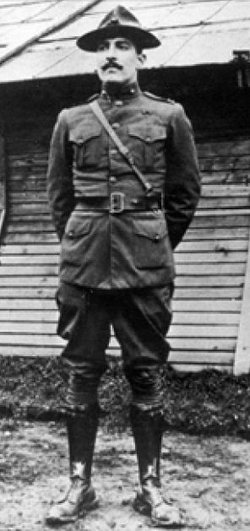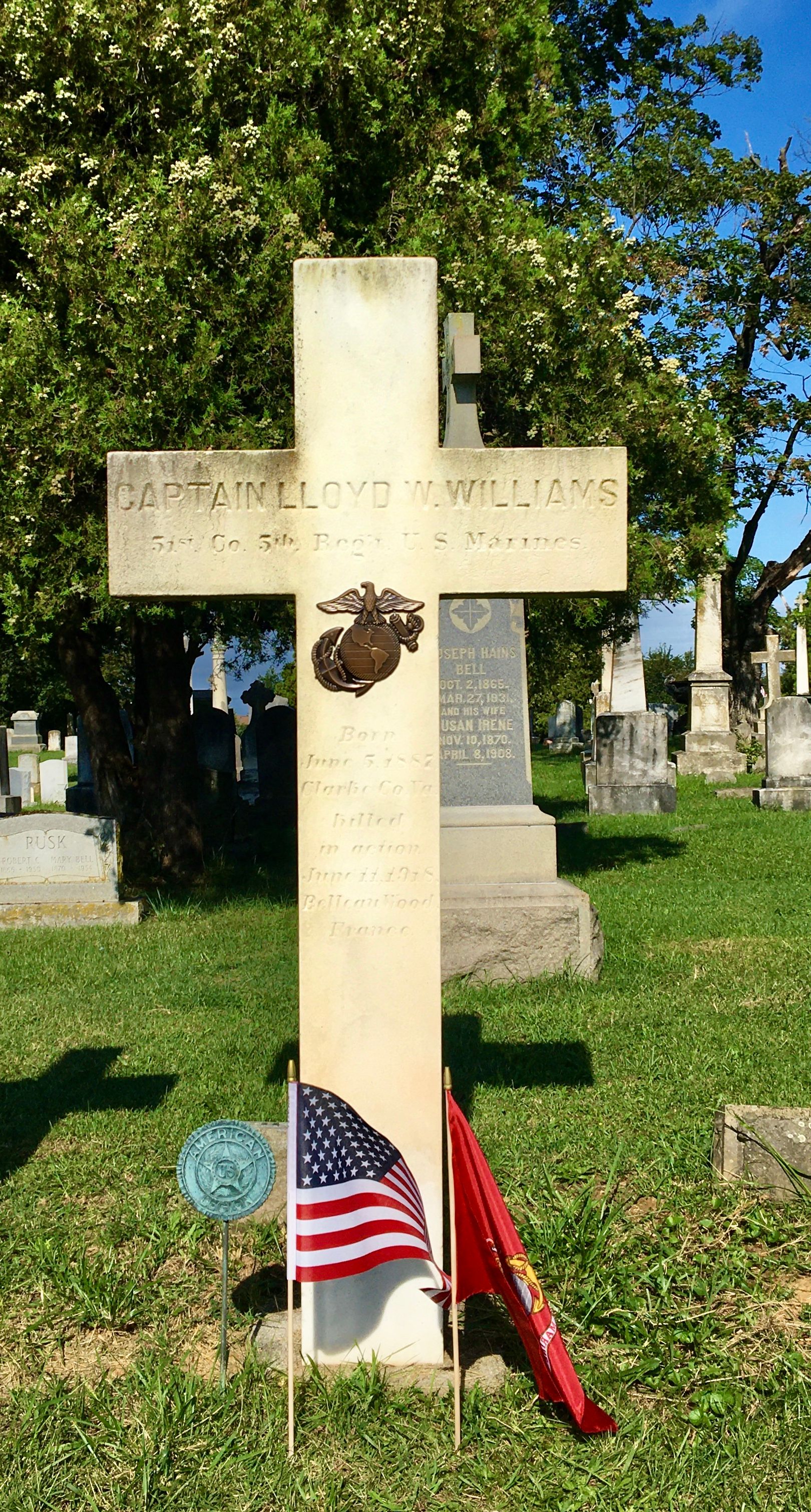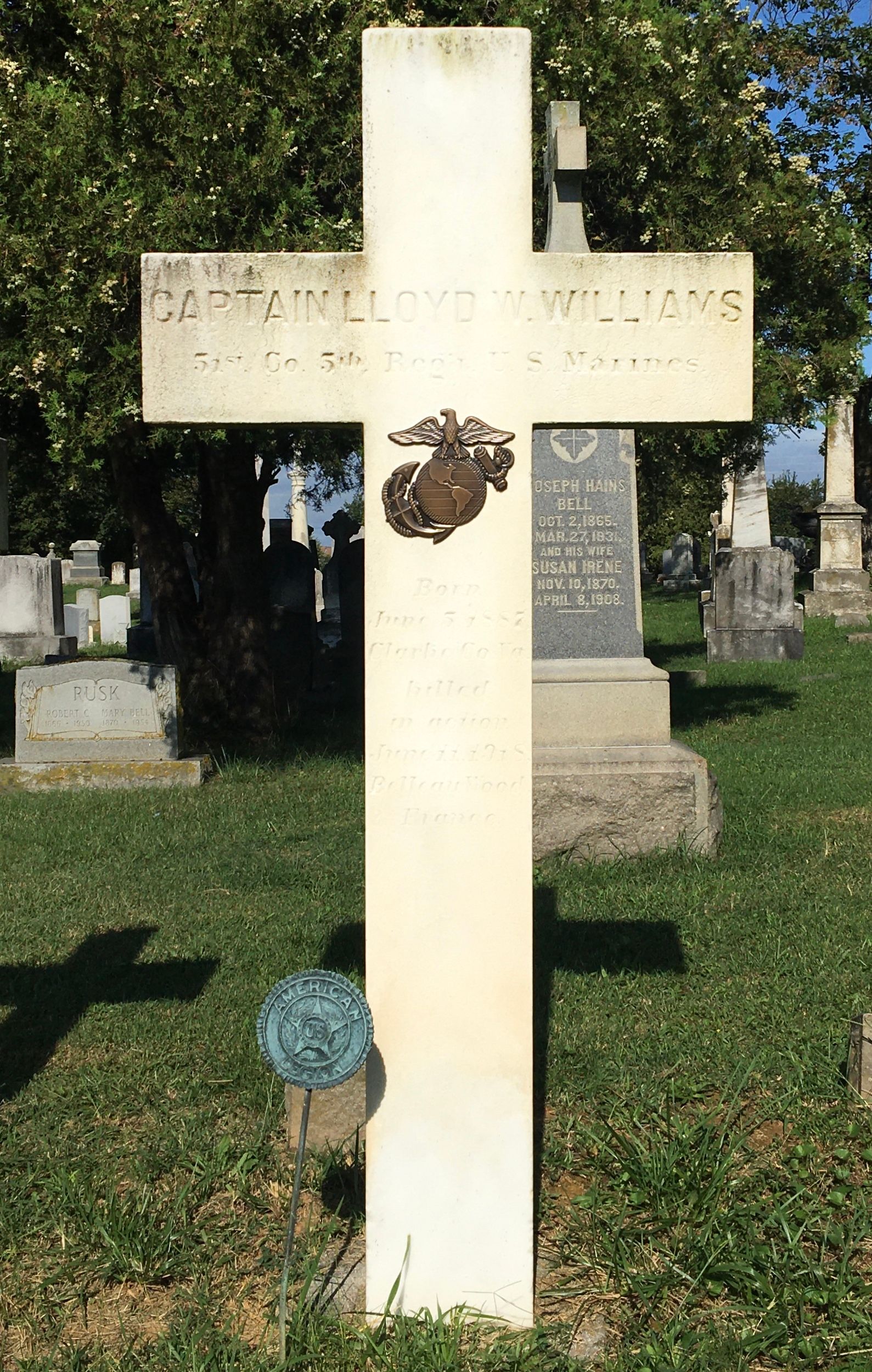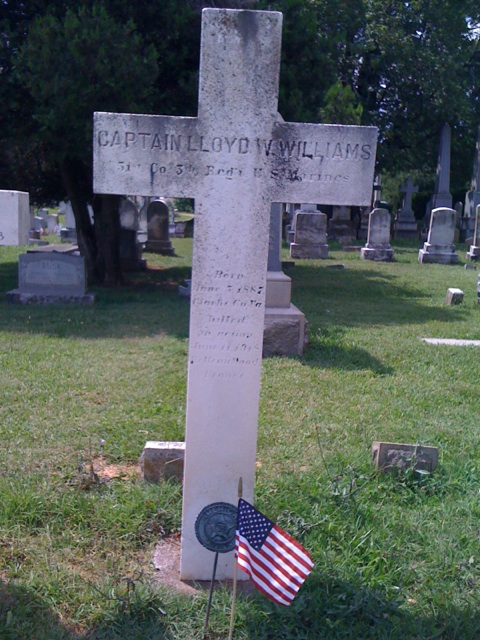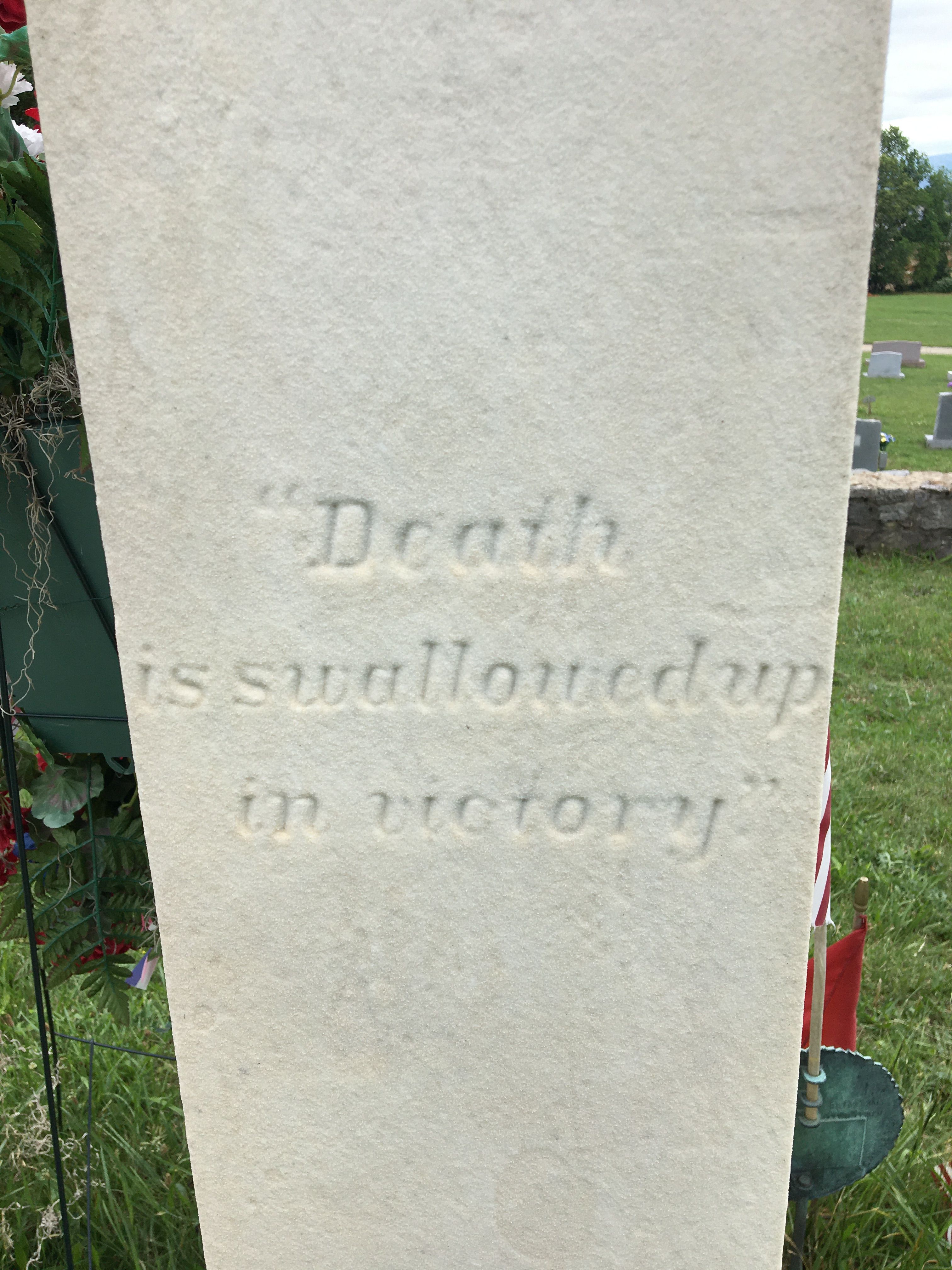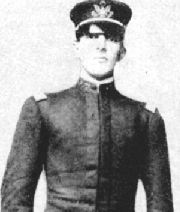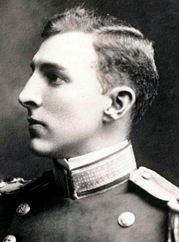As a career Marine officer, Williams served in Cuba, the Philippines, Marine Barracks Charleston, S.C. (enroute, 12/1910), sea duty aboard American battleships (aboard the USS Mississippi, BB-23, 7/10/1911), and time at the Marine Corps Headquarters in Washington, DC. Upon the outbreak of trouble in Nicaragua in 1912, he was sent there and saw his first combat action in the capture of the city of Leon.
During his time in Charleston, S.C., he met Selina Ravenel, and, after his return from Nicaragua, he married her, on June 5, 1913, at Spartanburg, South Carolina. Three years later, their only child, Selina, was born. Also in that same year, Williams had risen to the rank of captain.
Immediately after the United States entered World War I, the 5th Marine Division sailed for France. Captain Williams was assigned to command the division's 51st Company in the 2nd Battalion.
On June 1, 1918, Williams' command was sent to support the French army at Belleau Wood. As the Marines arrived, they found French troops retreating through their lines. A French colonel, attempting to acquaint the Americans with the realities of the situation and not trusting his spoken English, scribbled a note to Williams, ordering them to retreat. The Marine officer looked at the Frenchman coldly and said, "Retreat, hell! We just got here." Williams reported the incident to his battalion commander with the following message: "French drawing back through us. French major ordered me to withdraw with him. Told him to 'go to hell'."
On June 11, 1918, Williams led an assault that routed the German defenders at Belleau Wood. Of the 10 officers and 250 men who started the attack, only one officer and 16 enlisted men escaped death or injury. Having received a severe wound, Williams was said to have told corpsmen who approached him, "Don't bother with me. Take care of my good men."
After Williams had been taken to the dressing station in Lucy-le-Bocage, the position came under heavy fire from German artillery, some of which were firing poison gas shells. Despite the shelling, Lt. (USNRF) Orlando H. Petty continued to evacuate and treat the wounded, even after he was knocked to the ground and his gas mask rendered useless by an exploding shell. When the dressing station was destroyed, he personally carried wounded Captain Williams to safety. For these actions, Petty was awarded the Medal of Honor. Despite the rescue, Captain Williams died of his wounds on June 12.
Williams remains were originally buried in France, but in 1921 his family arranged for his return to the United States, for reburial in Green Hill Cemetery in Berryville. Local and national newspapers reported the progress of his casket as it was loaded on to a Navy ship in France; its arrival in New York, where General Pershing offered a eulogy; and its shipment by train from New York to Washington, and finally to Berryville. A military honor guard from Quantico Marine Barracks escorted the coffin the entire trip.
On July 21, over one thousand people lined the streets of Berryville to honor him. The casket arrived by train and was loaded on to a horse drawn caisson for the procession to Grace Episcopal Church where Williams' remains lay in state before the funeral service. Since the church could not hold the large number of mourners, the doors and windows of the church were opened and hundreds of people circled the church to listen to the funeral service. After the church service, the funeral procession was lead by a detail of Legionnaires from Lloyd Williams Post 41 of the American Legion to the burial site in Green Hill Cemetery.
Williams was posthumously promoted to major and awarded the Distinguished Service Cross.
After Major Williams' death, his widow honored the memory of her husband by changing the name of their daughter from Selina to Lloyd.
A stained glass window in Grace Episcopal Church, in Berryville, was dedicated to the memory of Major Lloyd.
In honor of Major Williams' remark of June 1, 1918, the 2nd Battalion, 5th Marine Regiment still retains the motto, "Retreat, hell!"
In 1957, Williams was memorialized in the naming of a residence hall (Major Williams Hall) at Virginia Tech. It is currently used as a faculty building.
*Though a number of sites, including Berryville's American Legion site, shows that he graduated from Virginia Tech in 1910, a Virginia Tech site shows Williams graduating in 1907.
As a career Marine officer, Williams served in Cuba, the Philippines, Marine Barracks Charleston, S.C. (enroute, 12/1910), sea duty aboard American battleships (aboard the USS Mississippi, BB-23, 7/10/1911), and time at the Marine Corps Headquarters in Washington, DC. Upon the outbreak of trouble in Nicaragua in 1912, he was sent there and saw his first combat action in the capture of the city of Leon.
During his time in Charleston, S.C., he met Selina Ravenel, and, after his return from Nicaragua, he married her, on June 5, 1913, at Spartanburg, South Carolina. Three years later, their only child, Selina, was born. Also in that same year, Williams had risen to the rank of captain.
Immediately after the United States entered World War I, the 5th Marine Division sailed for France. Captain Williams was assigned to command the division's 51st Company in the 2nd Battalion.
On June 1, 1918, Williams' command was sent to support the French army at Belleau Wood. As the Marines arrived, they found French troops retreating through their lines. A French colonel, attempting to acquaint the Americans with the realities of the situation and not trusting his spoken English, scribbled a note to Williams, ordering them to retreat. The Marine officer looked at the Frenchman coldly and said, "Retreat, hell! We just got here." Williams reported the incident to his battalion commander with the following message: "French drawing back through us. French major ordered me to withdraw with him. Told him to 'go to hell'."
On June 11, 1918, Williams led an assault that routed the German defenders at Belleau Wood. Of the 10 officers and 250 men who started the attack, only one officer and 16 enlisted men escaped death or injury. Having received a severe wound, Williams was said to have told corpsmen who approached him, "Don't bother with me. Take care of my good men."
After Williams had been taken to the dressing station in Lucy-le-Bocage, the position came under heavy fire from German artillery, some of which were firing poison gas shells. Despite the shelling, Lt. (USNRF) Orlando H. Petty continued to evacuate and treat the wounded, even after he was knocked to the ground and his gas mask rendered useless by an exploding shell. When the dressing station was destroyed, he personally carried wounded Captain Williams to safety. For these actions, Petty was awarded the Medal of Honor. Despite the rescue, Captain Williams died of his wounds on June 12.
Williams remains were originally buried in France, but in 1921 his family arranged for his return to the United States, for reburial in Green Hill Cemetery in Berryville. Local and national newspapers reported the progress of his casket as it was loaded on to a Navy ship in France; its arrival in New York, where General Pershing offered a eulogy; and its shipment by train from New York to Washington, and finally to Berryville. A military honor guard from Quantico Marine Barracks escorted the coffin the entire trip.
On July 21, over one thousand people lined the streets of Berryville to honor him. The casket arrived by train and was loaded on to a horse drawn caisson for the procession to Grace Episcopal Church where Williams' remains lay in state before the funeral service. Since the church could not hold the large number of mourners, the doors and windows of the church were opened and hundreds of people circled the church to listen to the funeral service. After the church service, the funeral procession was lead by a detail of Legionnaires from Lloyd Williams Post 41 of the American Legion to the burial site in Green Hill Cemetery.
Williams was posthumously promoted to major and awarded the Distinguished Service Cross.
After Major Williams' death, his widow honored the memory of her husband by changing the name of their daughter from Selina to Lloyd.
A stained glass window in Grace Episcopal Church, in Berryville, was dedicated to the memory of Major Lloyd.
In honor of Major Williams' remark of June 1, 1918, the 2nd Battalion, 5th Marine Regiment still retains the motto, "Retreat, hell!"
In 1957, Williams was memorialized in the naming of a residence hall (Major Williams Hall) at Virginia Tech. It is currently used as a faculty building.
*Though a number of sites, including Berryville's American Legion site, shows that he graduated from Virginia Tech in 1910, a Virginia Tech site shows Williams graduating in 1907.
